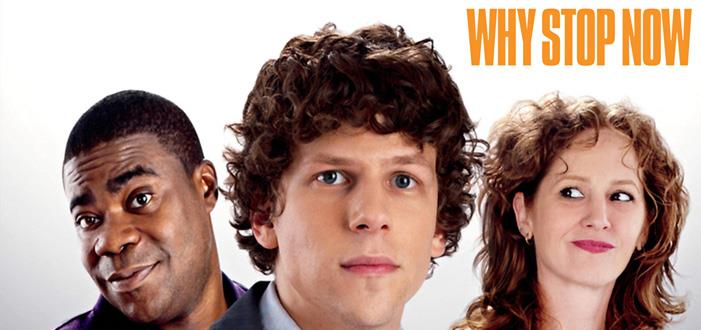
Why Stop Now
Why Stop Now portrays the frustration of the imposition of loved ones on one’s own ability to grow as a person. And this is done in its most extreme form. Mr. Eisenberg plays a piano prodigy who has to dedicate a part of his life toward maintaining the livelihood of his family, thus interrupting his ability to continue to excel at flourishing with his gift. His mother is a drug addict who tempestuously destroys the integrity of the family unit he has no choice but to be responsible for. And it is quite dramatic how comfortable he is in being the man of the house – he noticeably is comfortable taking charge. And this includes taking charge of his mother’s drug addiction.
Wrought with the risk of trying to put her back on the straight and narrow in what would be typically a role reversal whereby the mother would be admitting her son to rehab, the prodigy sacrifices his ability to audition for the love of his mother and for the love of his family. Is this proper? This is no doubt unconditional love but is it righteous to treat one’s family unconditionally? This would make valuing family higher than valuing morality, for clearly the logic is reduced to absurdity were we to suggest that protecting a family of criminals is more important than protecting the rule of law. This is dangerously slippery, however, as to the extreme there may be a tendency to reject any gratitude to family life whatsoever. Where then is the balance? When does the pianist decide that enough is enough and that his chance for a better life is being de-railed by his mother? When does he realize that if his mother had any love for him she would eliminate her self-destructive habit? The drug addiction is an act of narcissism then, for placing such an onerous burden on a young man’s life, while he can manage it, is unjust. It is unfair for him to have to support his sister when he can be perfecting his art. But this is all in theory of course. Life is such that dealing with human beings leads to the prevalence of injustice. And this is the point: how much should one tolerate the injustice committed by a loved one? When is the presumption of selfishness turned toward the self-destructive that bring all those around them down?
It is admirable what Mr. Eisenberg’s character possesses. Resolution is the best word to describe it. I suppose that comes from preserving his sanity by having a direct connection with the transcendent granting him the ability to feel authentic whenever he places his fingers on piano keys. Yet it is shameful that his authenticity is dampened by the uncontrollability of his mother. What then is the remedy? Simply put, the education of self-help. For clearly, the mother has no intention of being so harmful to her son. She simply does not know how to control herself.
Grade: B+

